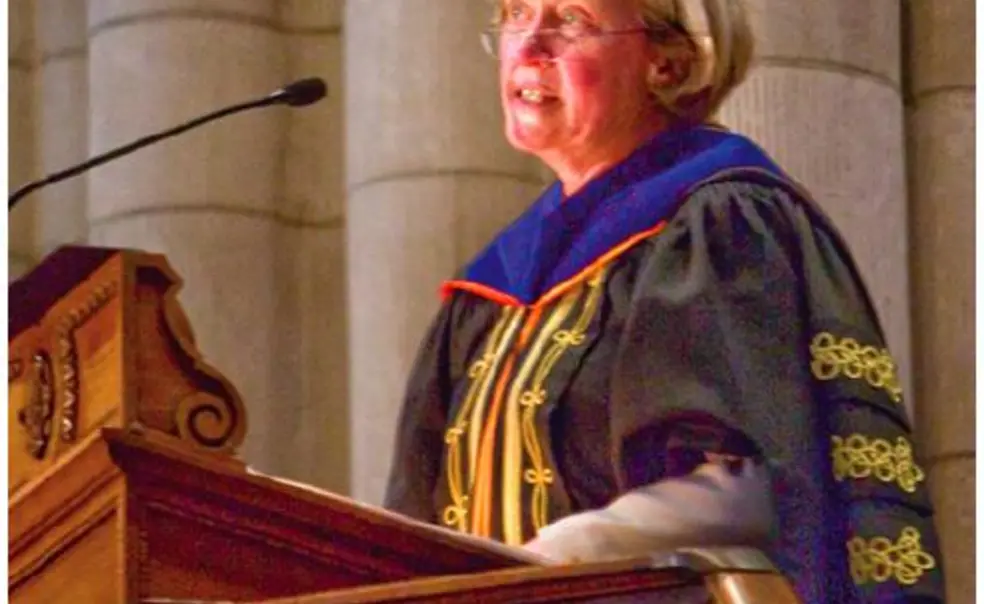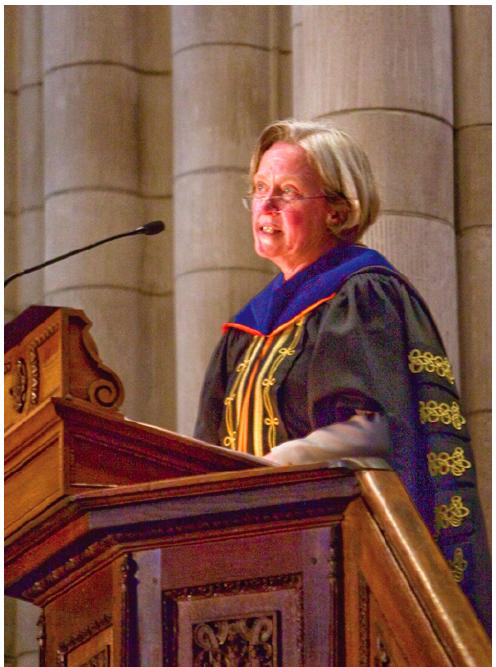Opening Exercises: Tilghman’s Top Ten
On September 13, under sunny skies, we officially launched a new academic year with Opening Exercises in the Princeton University Chapel. Taking my cue from television host David Letterman, I enumerated for our newly matriculated freshmen the top ten things I believe they should do before they graduate. Here are some excerpts from my address.—S.M.T.
I love Opening Exercises—the chapel choir’s beautiful voices raised in song, the African drums, the colorful flying banners, and, of course, the procession in academic regalia, for Princetonians love parades, particularly ones that are awash in orange and black. But what I love most about Opening Exercises is the hope for the future that overcomes me as I look into your faces while walking up and down the aisle, trying to elicit smiles. I see future scholars, community organizers, entrepreneurs, artists, public servants, musicians, bankers, teachers, athletes, doctors, scientists, judges, CEOs, inventors—I see leaders in every walk of life. For that is the purpose of a Princeton education—to prepare very talented young men and women like you to make a positive difference in the world by helping you develop the qualities that are required of leaders: a devotion to critical thinking over ideology; the self-confidence that it takes to change your mind in the face of new evidence; the capacity to speak the truth as you understand it; a deep respect for learning as opposed to uninformed opinion; and the strength of character that grows out of humility and compassion for your fellow human beings.
Having told you what I love about Opening Exercises, I will now confess to you what I find taxing. Each year I must find new ways to exhort students to make the most of the next four years. Because these addresses are published in the Princeton Alumni Weekly, I must come up with something new every fall—a challenge that increases in magnitude with each passing year. This year, as I thought about what new message I might deliver to your class, I decided to take my inspiration from David Letterman and offer up not one but ten things I hope you do before you march proudly out the FitzRandolph Gates. So here they are, in no particular order, and minus the drum roll:
No. 10: Call, e-mail, text or IM home, but not too often. As hard as it is for parents to accept, we did not admit them to Princeton when we admitted you. The next four years will mark the final stage in your transition from adolescence to adulthood, and now is the time for you to strike out on your own and make your own decisions. You will surely make mistakes—everyone does—but you will also learn from them.
No. 9: When you are feeling overwhelmed by Princeton, as every single student surely does at some point, say the following things to yourselves: “I was chosen from among 22,000 applicants by an experienced group of admission officers, who are not known for making mistakes. No, I didn’t win the math Olympiad at the age of 10, and I don’t speak 14 languages. I couldn’t dunk a basketball if my life depended on it, and I get stage fright just thinking about stepping in front of an audience. But I bring to this University a unique set of intellectual and personal qualities that my classmates will learn from and that my professors, coaches, conductors, directors, advisers and mentors will help me strengthen. I have earned the right to be here.”
No. 8: Approach Princeton with gusto, but not abandon. You will face a dizzying array of choices in the next few months—the courses you will take, the student groups you will join, the friends you will cultivate. Keep in mind that less is often more. When we recommend that you begin by taking four courses a semester, and not five or six or seven as sometimes you want to do, we do so because we believe that you will gain more from delving deeply into four subjects than by skimming the surface of a larger number. You do not need to do everything in your first semester. Pace yourselves so that you will have time to savor each moment.
No. 7: Invite your favorite professor to lunch or dinner in your residential college. With a student-faculty ratio of less than 6-to-1, Princeton provides the opportunity to get to know your professors well, but only if you are prepared to take some initiative and meet them half way. Don’t let their Pulitzer and Nobel Prizes intimidate you—they are here because they are committed to your education. No. 6: Use your time at Princeton to “encounter the other.” Dean of Admission Janet Rapelye and her colleagues have made sure that your class is composed of students from all over this country and around the globe, with different languages, religions, political beliefs, socio-economic circumstances and perspectives on the world. You will never again live in the midst of such extraordinary diversity, and the chance to explore it is an integral part of your Princeton education. I hope you leave your comfort zone in the rush to embrace what Princeton’s 13th president, Woodrow Wilson, called “unchosen contacts.”
No. 5: Don’t confuse the next four years of education in the liberal arts with pre-professional education. The purpose of a Princeton education is most decidedly not to prepare you for one profession, but for any profession, including ones that have not yet been invented. Or said in a slightly different way, don’t think of the next four years as an exercise in resume building toward some specific goal; instead think of it as a grand intellectual adventure. No. 4: Study what fascinates you, not just the subjects in which you shone in high school, if for no other reason than you will have a much greater likelihood of excelling at your studies if they happen to coincide with something that ignites your curiosity. And at the risk of appearing to contradict what I just said, be sure to take at least one course this year in a subject you know absolutely nothing about. No matter how comprehensive your high school education was, it will not have encompassed the breadth of learning that is represented by our 34 academic departments and our rich collection of interdisciplinary programs. Princeton is the ideal place, and this is the ideal time, to strike out in new intellectual directions, holding out the possibility that in so doing, you will discover what you were truly meant to do with your life.
No. 3: Follow the example of Michelle Obama, Princeton class of 1985, and embrace our informal motto “Princeton in the nation’s service and in the service of all nations” while you are here. This motto reflects an abiding conviction that the privilege of a Princeton education brings with it a lifelong responsibility to work on behalf of those less fortunate, and there is no better time to exercise that responsibility than right now. Not only is this the right thing to do, but as Ralph Waldo Emerson said, “It is one of the most beautiful compensations of this life that no man can sincerely try to help another without helping himself.”
No. 2: Break out of the orange bubble and explore the world. You live at a time when the barriers that used to isolate nation states and their citizens from one another have all but disappeared. The assembled group of freshmen and first-year graduate students in this chapel are exhibit one for this proposition. Whether you believe the world is round, flat or shrinking, it is a world that you must be prepared to live in and to embrace. At Princeton you will encounter a myriad of ways to broaden your international perspectives: through coursework here on campus and in research opportunities, internships and study abroad options elsewhere. And you have the chance to conquer new languages, which is the surest path to understanding other cultures. I hope you take advantage of these opportunities and leave Princeton declaring yourselves to be educated citizens of the world—true cosmopolitans.
No. 1: Remember to exercise, eat healthy, get some sleep and, above all, have fun! You are very likely to meet friends who will remain with you for the rest of your lives, but this won’t happen unless you make time for them. As long as what you do does not pose harm to yourself or others, I give you free license to be as silly and inventive as you like. Yes, there is plenty of work to do while you are here, but this is a place to live as well as to study, and a place to learn how to live life to its fullest. Princeton is serious, but it is not somber; it is a place that values beauty and freshness and light and the renewal that comes from times of reflection and times of joy. So I hope you will embark on the next four years with a light heart and in high spirits.













No responses yet